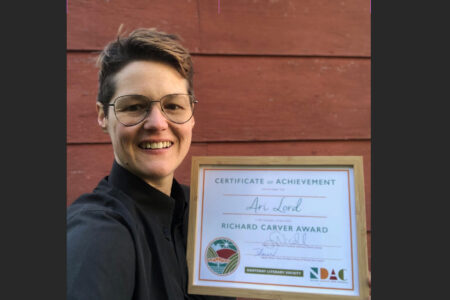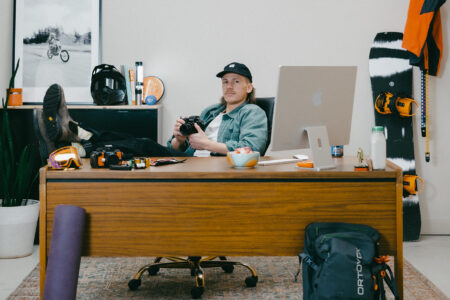'Start Now and Do Something Big'--an Interview with the Organizers of Keep the Beat, Nelson’s Most Successful Fundraiser
The annual one-day music festival Keep the Beat has raised about $12,000 in a single day in each of its past few years. And it has done that without selling any tickets, without adults, and with almost no overhead. The money all goes to War Child Canada.
This year’s event runs from noon to 10pm at Lakeside Park on Wednesday, July 25.
The original teenage organizers of Keep the Beat in 2005 came up with an ingenious idea: have a music festival in a place where there are lots of people already (Lakeside Park) and don’t charge admission. Just pass the hat.
Which they do, all day and evening while a succession of bands play on a temporary stage. But it’s not a hat they pass. It’s a big bucket.
The organizing group always consists of a dozen or so girls, and the membership gradually changes over the years as the older ones move on and younger ones join. It’s an extraordinary example of peer mentoring, with the younger ones eventually becoming mentors themselves.
The Nelson Daily interviewed three of the organizers of Keep the Beat 2012: veterans Aisha Smith (17) and Kate Harvey-Vieira (17), and newcomer Maddy Murphy (15).
The Nelson Daily: This event is a success on many levels: lots of people attend and lots of money is made. Why is it so successful?
Aisha: It has become a big community event because it is youth driven. We do have a bit of parents’ help but it is mainly us that do everything, and I think the community sees it’s done by the new generation, and they look up to that. Also it goes to a great cause, War Child Canada.
Kate: I think everyone who is part of Keep the Beat is really passionate about it and about War Child, and that plays a bit part in it, because when you care about something that much, that will show and that will translate into success—a lot of people show up, we get a lot of money, we get a lot of good bands.
Where does that passion come from?
Kate: I think a lot of youth today see a lot of issues, and we can see it is up to us to change them. This is the time, we have to start now, and we have to do something big. It is not enough to have a bake sale, you have to do something big.
Why is it up to the youth? Are the older people off the hook now?
Aisha: It’s a great opportunity for the youth to put something on. We could rely on the older people but I think it is the passion to do something ourselves by ourselves.
There is no shortage of opportunities for you to be that passionate about these issues. There are hundreds of groups you could join? Why this one?
Kate: A big part of it for me is that War Child is a local organization, not local as in Nelson, but it is based out of Toronto so it is Canadian and they do help globally, they have projects all over the world, and that is a part of it for me.
Aisha: For me, it is something that was already started, so it is easy for us to join on and keep going. The four girls that started it seven years ago, I don’t know what their drive came from, but I think it is so powerful that they had that, and it has continued this long. So for me, it is that I already know it is so successful and I want to contribute to that.
Kate: And it’s so fun, it’s a music festival. Who in Nelson doesn’t love a music festival?
It’s young people being mentored by young people, right? What’s that like for you?
Maddy: I think if it had been by older people I would not have actually been as motivated to join because I would not have felt as powerful or heard in the group–my opinions and my ideas. And being able to relate to the mentors, they are only a couple of years older but it is really inspirational because they have been doing it for so long and I think, I can be like that in four years and I can be organizing such a big event.
Kate: This is my third year, and it is really interesting to see how my involvement personally grew as the years progressed. In the first year I did a few little odd jobs and came to meetings and hung out, and now this year I am the head of the silent auction and I feel I am very involved, and it’s really interesting.
What have you learned?
Kate: I have learned a lot about being organized and being sort of self-motivated. With Keep the Beat you can’t wait too long to get in contact with people about the stage or to contact bands, you really need to be on it and it is good for me because I am kind of a procrastinator, but here its like, if I don’t do it it’s not going to get done.
Aisha: Like Maddy, I was in Grade 9 when I started Keep the Beat and I was the youngest. Kate is only a year older than me and I could easily relate to her because we were so close already, but I was really, really intimidated when I started out. But like Kate said, in her first year she just did a couple of things and that was the same for me, and I have just learned that working in a team is so powerful. You can be really self-driven but when you are self-driven in a teamwork environment it definitely has more of an effect.
You certainly don’t seem very intimidated now.
Aisha: No, and that’s the thing, I was intimidated when I started, and last year I got more comfortable and this year it was up to us, because we are the oldest ones. It was so crazy this year to see that we have pulled pretty much the whole event together in the last month and half. It’s amazing. I was really scared it was not going to work out, but we have all worked so well together and so I have learned you have to work well together if you want it to really happen.
When you are walking around at the event with a bucket, asking people to put money in it, how does that feel?
Aisha: Sometimes I feel awkward. I remember the first year, they told me go out, take the bucket, and I was so scared. I was like, no, I can’t go up to people and ask them for money and shove this bucket in their face. But now I just know that people are really willing to give you money and they want you to come up to them and be like, hey, here’s a bucket, can you give us some money. But it is still a bit awkward and intimidating to do that but the thing is that they are there to contribute so…
Kate:You have to go and stick a bucket in their face, literally, and that has been hard for me. That is another thing I have learned is to get in people’s faces, not in a rude way. We try not to be obnoxious but you have to go round and go to businesses and ask for donations.
Last year I was the MC, and toward the end of the event there was a real push to get enough money to reach our goal and I had to go up and they told me, Kate, it’s time to guilt trip them, you have to guilt trip them hard, and they gave me this whole speech, and I got my guilt trip voice on and went up there and told everyone what’s up. It was hard, but it’s something you have to do.
Maddy: Even with the flyers, you are walking down the street, and you have to shove them in people’s hands, they don’t even know what it is, and you just kind of shove it in their hands. It’s kind of putting yourself out there.
So you are ready to walk around with a bucket now too, Maddy?
Maddy: I’m not that nervous about it. I had to contact our mayor and Alex Atamanenko and Michelle Mungall. It’s all intimidating but it is kind of what you have to do.
Why have there never been any boys in this group?
Aisha: There have been boys.
A very, very small minority. More than one?
Aisha: Well two years ago we had Eli Zibin. And he led the entire thing. He’s a guy. But he is a different kind of boy (laughter all around). I don’t really know, this year when we had people go on LVTV at school, and we said, hey come join Keep The Beat, and no guys ever came and I just don’t really understand why.
Kate: I think part of the reason is that Keep the Beat was started by a group of girls. So they have been a majority from the beginning, and I think a large part of the reason why people join it is it is a social thing and we all get together and have coffee and talk about things. When I joined with my friend Hannah, we were like let’s do Keep the Beat together, it will be so much fun, and I remember going to our first meeting holding hands. There are no boys and they don’t recruit other boys and they don’t have that momentum, as the girls do.
Maddy: The first boy to make the change and go in there would be really intimidated, like a roomful of ten girls who know each other, just walk in, bring your male presence, that might be awkward for them.
Do you think that boys in high school are less interested than girls in social issues?
Kate: Definitely. I kind of don’t want to say that because it comes off as kind of rude or pretentious, like girls are better and girls care more, and of course that is not true but I mean you go into any sort of social change group in the school—I was a big part of Social Justice for a few years and there was like one boy in the two years that I did that and with Keep the Beat and with Amnesty, it’s always like that.
Aisha: I think a lot of it is because it is a kind of stereotypical situation where, oh the girls will do that, they care more about it. And even if there are the guys who really do care about these issues they are just way too intimidated by the girls, or scared they will get made fun of by other guys. We don’t need just a certain type of guy in Keep the Beat, we want everyone’s personality, so I think next year when we are trying to recruit more people, we definitely should try to recruit more guys because we need their opinion, we don’t want it to be all about the girls.
Kate: And also we need boys to put the stage together, we need boys on the day of the event to do all the manly work! (Laughter)
Maddy: We don’t know what musicians might attract more of the younger guys in town, I’m sure Laura Landsberg and Aspen Switzer seem awesome for some younger women in Nelson but it would be valuable to have some boys in the group. We need the courage of one boy being able to step out and say, oh this is a good idea.
Kate: We have to make a conscious effort to recruit them. We can’t just sit back. We have to go out and be like, dude, join Keep the Beat, you know?
What do you like most about being involved in Keep the Beat?
Aisha: The experience, I have learned a lot— how to work in a team, how to be well organized, a lot about the issues in the world surrounding children and families affected by war. I have really enjoyed it and next year will be my last year and I think that I have learned a lot to go out into the world and be my own person and know these issues and that I can continue supporting them and be on my own.
Kate: It’s something to be proud of. For everyone, even if you are just doing a few little jobs or if you are leading the whole thing, on the day of the event you can look around and say, I accomplished this, I was a part of this, and we are making a change and I think that’s really amazing to wake up every morning and know I have done something worthwhile.
Maddy: Just being able to work with other people and be mentored by such nice people and the accomplishment you feel. I was in charge of getting tents, and then I was like, yeah, I got those tents, look what I can do.
Aisha: For people who have never come to Keep the Beat it is a really great experience. I remember going to my first Keep the Beat and I didn’t understand because I was so young, but I was amazed, and as I started to learn more about it, amazed by the fact that it is youth and we are giving to War Child Canada.
Kate: We do put this on for War Child and we also do it for the community. Everyone in Nelson knows what Keep the Beat is.
That is one of its signs of success, that it is so well-known, right?
Kate: Definitely, and I want to invite the community to come out once again and support us. And I’d like to thank everyone.
Here is the set list for Keep the Beat at Lakeside Park on July 25
12-12:45 Dallas Sauer
1-1:45 Laura and Paul Landsberg
2-2:45 Aspen Switzer & band
3-3:45 Rita Marie, Lisa Backus, Rick Lingard & Anna Backus
4:15-5 Captains of Kirk
5:15-6 Riun Garner
6:10-6:55 Thomas Loh with Jusdance
7-7:30 Slava Dance Group with Adham Shaikh
7:30-8:30 Adham Shaikh
8:40-10 Tofu Stravinski

























